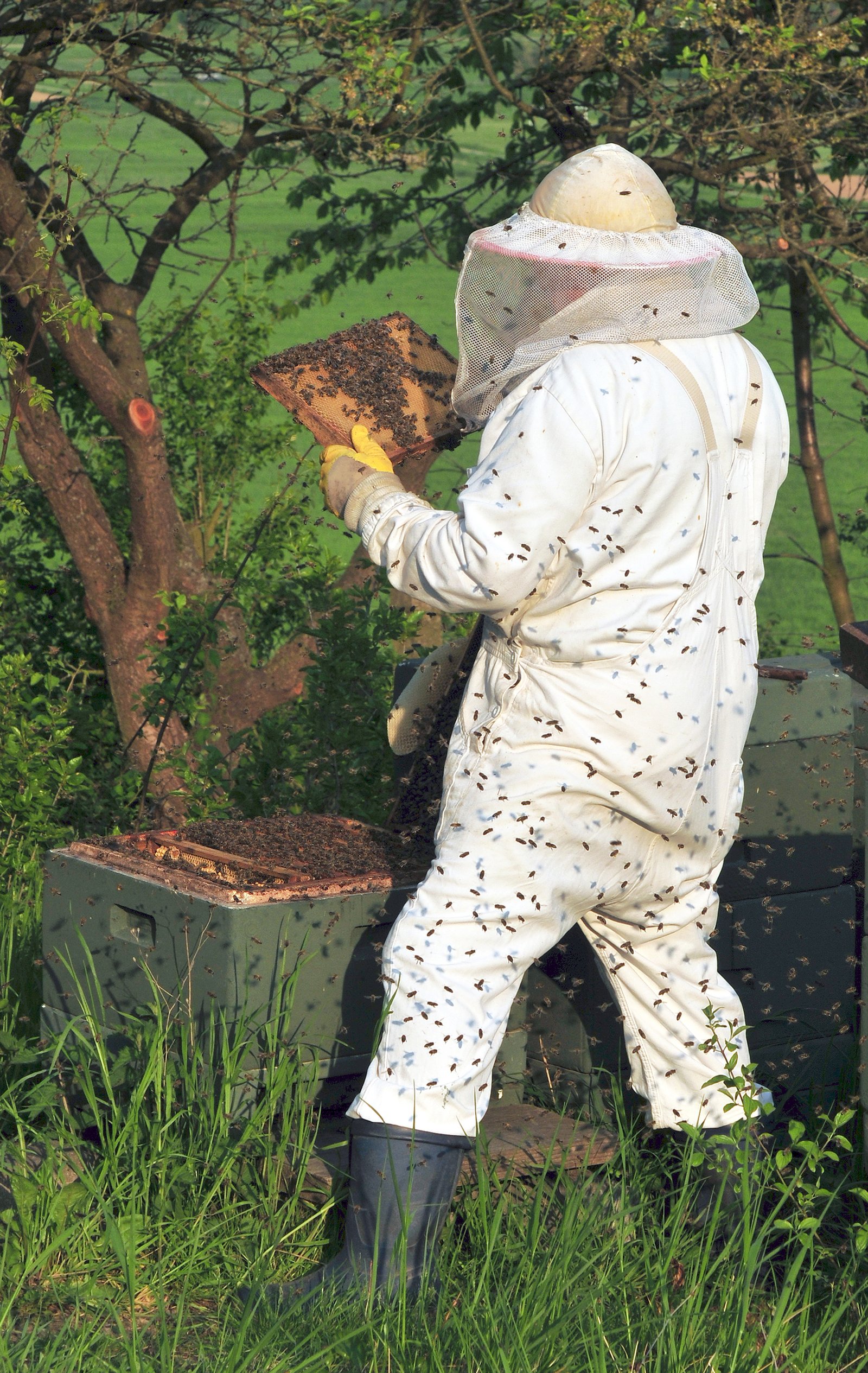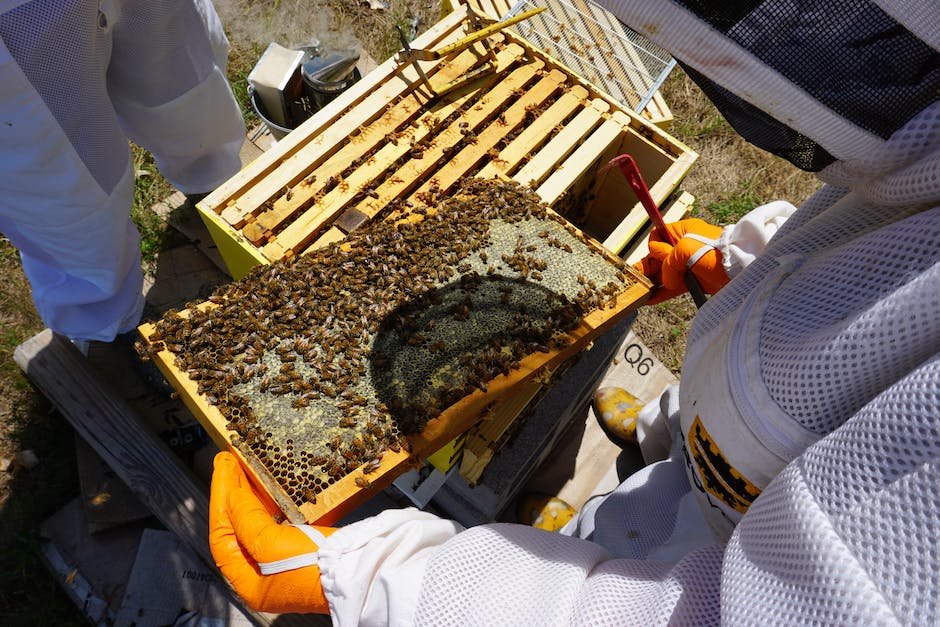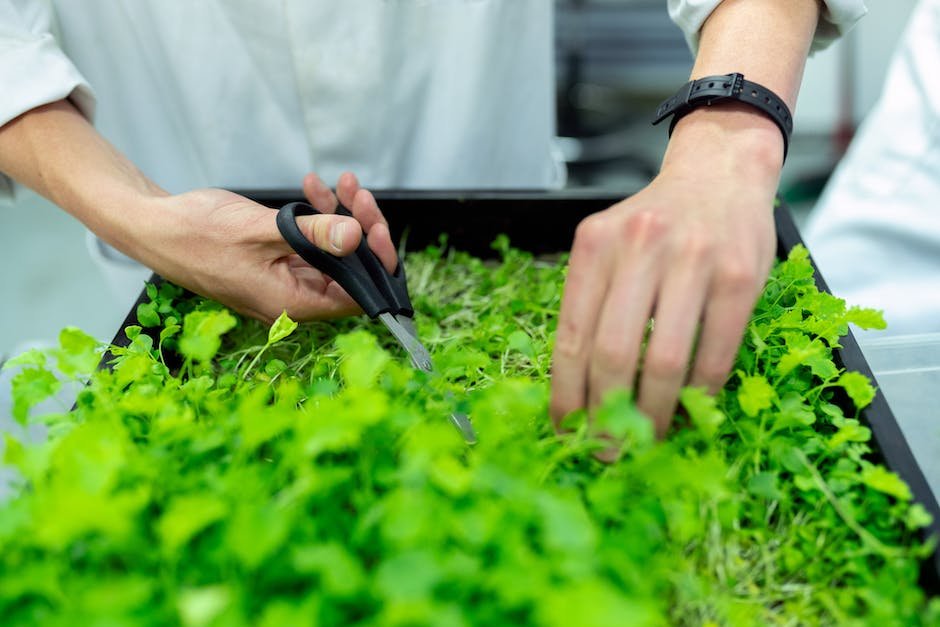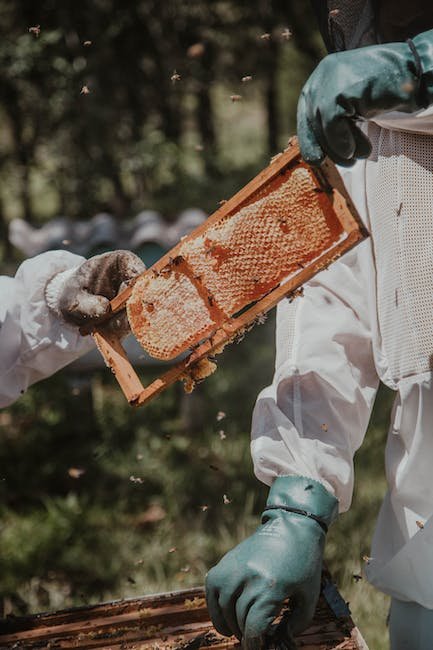In a world filled with bustling cities and picturesque landscapes, there exists a hidden army of unsung heroes diligently working to ensure the continuation of life as we know it. These tireless workers are none other than the humble honeybees, whose significance extends far beyond the delicious golden elixir they produce. As nature’s ultimate pollinators, bees play a vital role in preserving the delicate balance of ecosystems worldwide. However, as threats to their survival loom larger than ever, the art of beekeeping emerges as a powerful tool in the fight for pollinator conservation. With an unwavering commitment to safeguarding these remarkable creatures, beekeepers have positioned themselves at the forefront of a global movement destined to shape the future of our planet. Join us on a journey to uncover the astonishing importance of beekeeping in the realm of pollinator conservation and discover how a small community of dedicated individuals is making a colossal impact on the natural world.
Table of Contents
- The Importance of Beekeeping: Nurturing the Pollinator Community
- Empowering Beekeepers: Guardians of Biodiversity
- Enhancing Agricultural Sustainability: The Role of Beekeeping
- Protecting Fragile Ecosystems: Beekeeping as a Conservation Practice
- Promoting Awareness and Education: Supporting Beekeeping Initiatives
- Q&A
- In Retrospect

The Importance of Beekeeping: Nurturing the Pollinator Community
Beekeeping plays a crucial role in nurturing the pollinator community. While it may seem like a simple hobby or occupation, it goes beyond harvesting honey or enjoying a sweet treat. Without bees and other pollinators, our ecosystem and agricultural practices would be in jeopardy. Here are a few reasons why beekeeping is of utmost importance:
- Preserving biodiversity: Bees are incredible pollinators, aiding in the reproduction of countless plant and flower species. Through their pollen-gathering activities, bees help in maintaining biodiversity by fostering the growth and propagation of various plants.
- Fostering food production: Nearly one-third of the world’s food supply relies on pollinators such as bees. These diligent creatures assist in the fertilization of crops, ensuring abundant harvests of fruits, vegetables, nuts, and seeds. Without bees, our plates would have fewer options and food security would be at stake.
- Supporting environmental sustainability: Beekeeping encourages responsible land management and helps combat deforestation. By providing suitable habitats for bees, we create healthier ecosystems with thriving flora and fauna. Moreover, the presence of pollinators aids in maintaining the delicate balance of our natural environment.
By becoming a beekeeper or supporting local beekeepers, you contribute directly to the survival and growth of the pollinator community. It’s crucial to raise awareness about the significance of these industrious insects and create an environment that nurtures their well-being. So, let’s don our beekeeping gear and lend a helping hand to nature’s tiny heroes!

Empowering Beekeepers: Guardians of Biodiversity
Bees, those tiny yet mighty creatures, play a vital role in maintaining the delicate balance of biodiversity. As they flit from flower to flower, they unknowingly carry out the essential task of pollination, enabling countless plants to reproduce and spread. However, bees are facing numerous challenges today, from habitat loss to pesticide exposure, which threaten their numbers and thus the diverse ecosystems they support.
Recognizing the significance of beekeeping in safeguarding biodiversity, we are committed to empowering beekeepers and their crucial role as the guardians of our environment. By providing them with the knowledge, tools, and support they need, we enable them to create sustainable and thriving bee colonies.
Our approach focuses on:
- Education: We educate beekeepers about best practices for hive management, promoting organic and sustainable beekeeping methods that prioritize the health and well-being of both bees and the surrounding environment.
- Research: Through collaboration with experts, we conduct research to better understand bee behavior, diseases, and threats. This knowledge helps beekeepers make informed decisions and adapt their practices to mitigate risks.
- Community Building: We foster a strong beekeeping community, where beekeepers can connect, share experiences, and lend support to one another. These networks provide an invaluable resource for addressing challenges and finding innovative solutions.
Empowering beekeepers not only ensures the survival of these remarkable insects but also leads to a ripple effect across ecosystems. As bees thrive, they pollinate a diverse array of plants, enabling the growth of fruits, vegetables, and countless flowering species that form the backbone of our ecosystems. Together, let’s embrace beekeeping as a way to protect and nurture our planet’s incredible biodiversity.

Enhancing Agricultural Sustainability: The Role of Beekeeping
Importance of Beekeeping in Enhancing Agricultural Sustainability
Beekeeping plays a vital role in promoting and maintaining agricultural sustainability. This age-old practice not only facilitates the production of natural honey but also contributes significantly to pollination and biodiversity.
Pollination:
- Beekeeping ensures efficient pollination of crops, leading to higher yields and improved crop quality.
- Honeybees are proficient pollinators, assisting in the reproduction of a wide variety of fruits, vegetables, and flowering plants.
- Their ability to transfer pollen from one plant to another facilitates genetic diversity and ensures the continuity of plant species.
Biodiversity Conservation:
- Beekeeping helps preserve biodiversity by providing habitats for bees and other pollinators.
- Creation of bee-friendly environments promotes the growth of plant species that are dependent on bee pollination.
- This symbiotic relationship enhances the ecological balance and longevity of diverse ecosystems.
In conclusion, beekeeping acts as a crucial catalyst for agricultural sustainability through its role in pollination and biodiversity conservation. The practice not only supports the production of honey but also contributes to the overall health and resilience of our ecosystems.

Protecting Fragile Ecosystems: Beekeeping as a Conservation Practice
Why Beekeeping is Important for Protecting Fragile Ecosystems
Beekeeping is not just a hobby or a means to produce honey; it is a critical conservation practice that plays a vital role in protecting fragile ecosystems. Bees are not just providers of sweet nectar and buzzing companions, but they are also powerful pollinators that contribute to the diversity and sustainability of our planet.
Here are a few reasons why beekeeping is essential for preserving delicate ecosystems:
- Pollination Powerhouse: Bees are responsible for pollinating a significant portion of the world’s flowering plants, including crops that are consumed by both humans and animals. By transporting pollen from one flower to another, bees facilitate fertilization, ensuring the reproduction of countless plant species. Without the industrious efforts of bees, the biodiversity of ecosystems would be severely impacted, and food production would decline.
- Biodiversity Boosters: Bees are essential for maintaining the health and diversity of various ecosystems. Their foraging activities enable them to contribute to the dispersal of seeds and promote the growth of new plant species. By facilitating cross-pollination, bees encourage genetic diversity within plant populations, leading to stronger and more resilient ecosystems.
- Environmental Indicators: Bees are incredibly sensitive to environmental changes, making them valuable indicators of ecosystem health. Their well-being reflects the overall condition of the environment, including the presence of pollutants, habitat destruction, and climate change impacts. By monitoring bee populations and their behaviors, beekeepers can detect and address environmental challenges promptly, effectively safeguarding fragile ecosystems.
Beekeeping as a conservation practice goes beyond just protecting the honeybee species; it extends to safeguarding the intricate web of life that relies on these remarkable pollinators. By supporting beekeeping initiatives and fostering a bee-friendly environment, we actively contribute to the protection and preservation of fragile ecosystems worldwide.
Promoting Awareness and Education: Supporting Beekeeping Initiatives
Our organization is dedicated to promoting awareness and education around the importance of beekeeping initiatives. Bees play a critical role in our ecosystem, pollinating a wide variety of crops and contributing to the biodiversity of our planet. To support this cause, we have undertaken several initiatives to educate and engage both individuals and communities.
Through our outreach programs, we aim to provide accessible and interactive learning opportunities. These include workshops and demonstrations led by experienced beekeepers, where participants can get hands-on experience and learn about the fascinating world of bees. We also organize informational sessions in schools, community centers, and local events, to raise awareness about the significance of bees and the challenges they face.
In addition to educational efforts, we actively support beekeeping initiatives by collaborating with local beekeepers and farmers. These partnerships enable us to establish and maintain bee-friendly habitats, such as community gardens and apiaries. By creating safe havens for bees to thrive, we not only protect their populations but also contribute to the sustainability of our environment.
To further enhance our impact, we also provide resources and guidance to individuals interested in becoming beekeepers. We offer mentorship programs and online forums where aspiring beekeepers can connect with experienced mentors and exchange knowledge. Through these initiatives, we aim to empower bee enthusiasts to become active participants in beekeeping, strengthening the overall beekeeping community.
By focusing on promoting awareness and education, we believe we can make a significant difference in the preservation and support of beekeeping initiatives. Join us in our efforts to protect these incredible pollinators and create a more bee-friendly world.
Q&A
Why is beekeeping important for pollinator conservation?
Beekeeping is crucial for pollinator conservation as bees play a significant role in pollinating plants, ensuring the production of fruits, vegetables, and seeds. By managing beehives, beekeepers help maintain healthy populations of bees and subsequently support the overall health of ecosystems.
What are the benefits of beekeeping for humans?
Beekeeping provides numerous benefits for humans, such as the production of honey, beeswax, and other bee-related products. Additionally, beekeeping contributes to the agricultural industry by enhancing crop pollination, increasing yields, and ensuring food security.
How does beekeeping promote biodiversity?
Beekeeping promotes biodiversity by facilitating the pollination of a wide variety of plants. Bees visit flowers to collect nectar and pollen, transferring pollen from one flower to another in the process, which aids in the reproduction of plants and the maintenance of diverse ecosystems.
What threats do bees and other pollinators face?
Bees and other pollinators face numerous threats, including habitat loss, pesticide exposure, climate change, and diseases. These factors contribute to declining populations, which hinders pollination and jeopardizes biodiversity and food production.
How does beekeeping help against declining bee populations?
By engaging in responsible beekeeping practices, beekeepers contribute to the conservation of bees. They provide suitable habitats and nutrition, monitor hive health, and help control pests and diseases, all of which can effectively counteract the decline and promote the recovery of bee populations.
Can anyone become a beekeeper?
Yes, anyone with an interest in beekeeping can become a beekeeper, although it requires acquiring knowledge, skills, and the necessary equipment. Joining local beekeeping associations and taking training courses are great ways to start learning and gaining support from experienced beekeepers.
What can individuals do to support pollinator conservation?
Individuals can support pollinator conservation by planting native flowering plants in their gardens or on balconies, avoiding the use of pesticides, providing bee nesting habitats, and spreading awareness about the importance of pollinators. Supporting local beekeepers and buying their products also contributes to the sustainability of beekeeping.
In Retrospect
As we draw the curtains on this exploration into the extraordinary world of beekeeping, we are left in awe of the immense significance it holds for pollinator conservation. From the humble buzzing of bees to the intricate dance they perform within our ecosystems, these remarkable creatures have revealed themselves as the unsung heroes of our natural world.
In the past, their tireless efforts were often overlooked, with many unaware of the webs of life that they wove behind the scenes. Yet now, as we face a critical juncture in our planet’s history, the vital role of beekeeping takes center stage. It serves as a beacon of hope, illuminating a path towards sustainable coexistence with the countless species that depend on these diligent pollinators.
Through the gentle nurture of beekeepers, we witness a harmonious alliance between humans and bees, a collaboration that ensures the continuation of our ecosystems’ flourishing diversity. This shared responsibility transcends borders, cultures, and continents, as guardians of bees emerge in every corner of the globe. Becoming a beekeeper is not merely adopting a hobby. It is embracing a stewardship of nature in its purest form.
The importance of beekeeping in pollinator conservation echoes through the ethereal beauty of fresh blooms, the symphony of fluttering wings, and the delightful taste of honey on our lips. It is a call to action, urging us to recognize the profound interconnectedness of all living beings and to safeguard the delicate balance of our shared home.
So, as we conclude this journey, let us take the lessons bestowed by these tiny marvels to heart. Let us honor the tireless work of bees by being mindful of our choices, cultivating environments that allow them to prosper, and advocating for policies that protect their habitats. In doing so, we honor the grand tapestry of life, ensuring that the vibrant dance of pollinators will continue to grace our world for generations to come.
May the wings of bees carry this message far and wide, forging a collective commitment to their preservation. Let us stand as guardians of their future and weave a stronger bond with the natural world. For in the delicate rhythm of bees’ flight, we find the cadence of our own existence, and in their conservation, we discover the key to our planet’s wellbeing.
As an affiliate, my content may feature links to products I personally use and recommend. By taking action, like subscribing or making a purchase, you’ll be supporting my work and fueling my taco cravings at the same time. Win-win, right?
Want to read more? Check out our Affiliate Disclosure page.